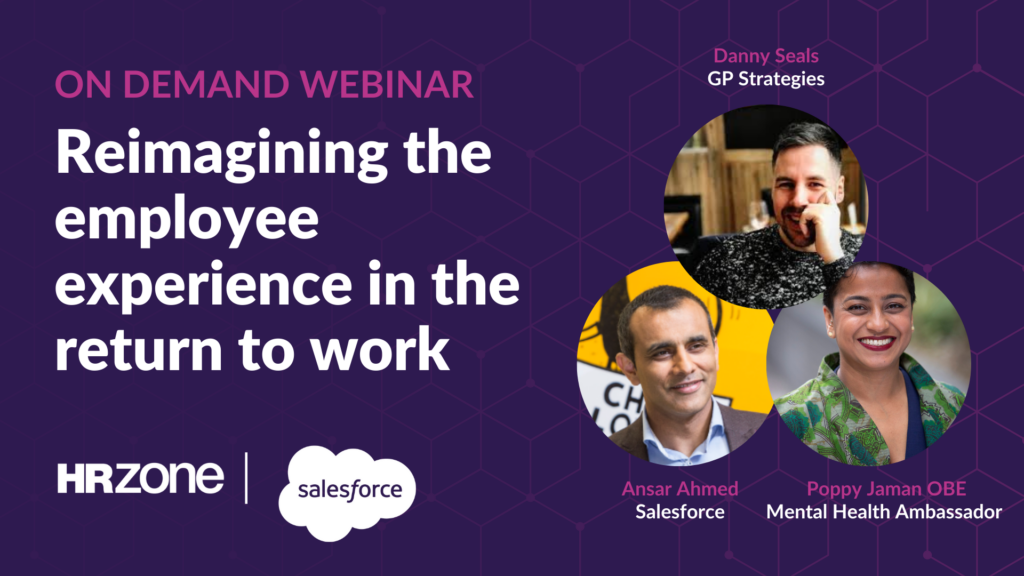To be an HR professional in 2020 is to be an expert at managing change, as surely there’s no other year in living memory that has seen as much of it as rapidly. Just as the industry was getting to grips with return to work planning, the government announced this week that employees should once again work from home if they can. While your plans for returning to the office might be on hold or in the process of being reversed again, what remains a constant is the need to focus on the employee experience – not just in the here and now, but also for the future.
The majority of employees don’t want to return to work as we knew it. People are coming back to work with a whole new list of expectations.
This was the topic of our recent webinar, Reimagining the employee experience in your return-to-work strategy, where our panellists were…
- Ansar Ahmed, VP of Solution Engineering at Salesforce
- Danny Seals, Director of Design and Experience at GP Strategies
- Poppy Jaman OBE, Global Mental Health Ambassador and CEO of City Mental Health Alliance.
The changing landscape of employee experience
Danny Seals kicked things off with a presentation on the changing landscape of employee experience, in which he outlined the shifting expectations of employees in light of their experiences this year. “Recent surveys have shown that the majority of employees don’t want to return to work as we knew it. People are coming back to work with a whole new list of expectations,” he explained.
HR leaders looking to redesign their strategy should, he argued, ensure that they are human-centric, experience focused and informed by data and technology.
“Ultimately what we are doing is designing for transition”, he suggested. HR leaders therefore need to ask themselves:
- What new rituals do we need to create a thriving community?
- What value can technology and data insight give us to help remove friction and shape a smoother transition to work?
- When we do return, what we can do for our people’s wellbeing and mindset?
- How can we create safety in space?
Want to see the conversation in full? Watch the webinar on demand here.
Nurturing a positive mental health culture
Next, we moved onto a Q&A session where Ansar Ahmed and Poppy Jaman discussed the challenges that employers have faced in the last six months.
“Nobody imagined health to be a part of the core business strategy. Up until now it was always left with the HR teams, the wellbeing teams. It was a siloed thing that went alongside the ‘real business’. The pandemic has put health in the heart of business strategy for every single organisation and people are making sure that mental health is an integral part of that,” explained Jaman.
Psychological safety is a key area employers must address, she argued. In the past, this may have centered on encouraging employees to speak up if they saw something that didn’t fit with the values of the business or themselves, but today it is also about understanding the context of employees’ experience – as it pertains to issues like race, culture, health inequalities and mental health.
“It’s not just about having conversations that are in the business, it’s about remembering that your business is part of an eco-system and the outside world impacts us”.
To that end, she explained that there has been an increase in training around mental health issues. “There are a plethora of resources out there to help with normalising conversations about mental health and skilling up the workforce so they feel confident to do the right things. In the long-term, it’s also about sustaining this change through boardroom objectives and numbers”.
Building employee trust and resilience
“It’s clear that Covid-19 has changed employee expectations,” explained Ansar Ahmed. “Overnight, what employees now care about is workplace safety and balancing wellbeing and productivity in this ‘work from anywhere’ world.”
What lies at the heart of all these new expectations, he argued, is trust. “Observing trust in all your relationships is more important than ever before and every industry needs to adapt to these new expectations and build a foundation of trust in order to survive this crisis – and not just survive, but also to build long-term resilience”.
As we build our strategies for the future in the midst of ongoing uncertainty, trust should be at the forefront of our minds, argued Ahmed.
“We’ve seen organisations moving from a brand promise to a life promise. This isn’t just a concern for now or for reopening, these trust expectations are part of our new world. The key thing is: does your employer have a plan to adapt and to preserve trust?”
Want to see the conversation in full? Watch the webinar on demand here.
Useful resources
Here are links to some useful resources that were mentioned during the session:












